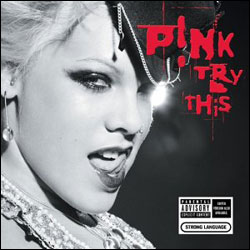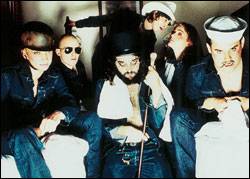PINK IS OUR reigning butch pop star not that the competition is all that fierce. Pop music’s current crew is a veritable smorgasbord of cream puffs: Justin Timberlake, Beyoncé, Jessica Simpson, Pharrell. . . . Pink’s only direct competition is fellow female white R&B sass peddler Christina Aguilera, though Xtina is more mouth than brawnshe’d snap her fingers in your face, but Pink would just shove past you and flip you the bird on her way out.
After Pink’s 2001 breakthrough Missundaztood, no one would dare compare her to damn Britney Spears ever again, thanks largely in part to another tough girl, songwriter and producer Linda Perry of ’90s flashes in the pan 4 Non Blondes. A veteran of San Francisco’s rock scene, Perry kneaded the power and fearlessness out of Pink as the latter sang about battling with her family and herself. She clawed her way out of the somewhat bland prototype of her 2000 debut, Can’t Take Me Home, to become a prominent, take-no-shit soul- rock singer. Missundaztood contained little fat but packed flavor throughout, thanks to Perry and Pink’s badassand movingchemistry.
Some time after Missundaztood, Pink and “punk” were commonly attached in the press. Ethically speaking, Pink’s defiance of Arista’s wishes and her collaboration with one-hit-wonder Perry was certainly punk. Pink also didn’t succumb to dopey booty-pimpin’ gimmicks to make a name for herself. But her music was never even in the same time zone as punk. She trafficked gloriously in bluesy soul-rockher favorite singer isn’t Janis Joplin for nothing. Still, there was something apropos about the news that Pink was working on songs for Missundaztood‘s follow-up with one of punk rock’s mainstays, Tim Armstrong of Rancid. Armstrong’s a deft songwriter for sure, dishing out one killer Rancid album after another, and his side band the Transplants proved the guy can hold his own while dabbling in electronica and hip-hop.
But there was one slight problemnamely, Pink’s balls are bigger than Armstrong’s. Her music’s (and her own) personality is dirtier and more exposed than his. She needed someone who could challenge her on a gut level in order for her to truly shine, and that’s not what happens on the aptly titled Try This (LaFace/ Arista). The album reflects Pink’s willingness to go outside her creative comfort zone and throw new ideas against the wall. Some things stick, but most of the stains left behind are standard-fare R&B-rock numbers that do little more than maintain Pink’s image as an aggressor. There are spots where Pink becomes vibrantly alive, notably on songs that lean on her intensely passionate, if ruffian, demeanor, and Perry nails two of her three assists. But the entity doesn’t cohere.
The first single, “Trouble,” is initially catchya grinding, organ-powered romp with revved-up guitars and a you-go-girl vibe. The trouble she sings about is herselfshockah! No one wants to touch her with a 10-foot pole because her reach is 11.5 feet. But the chorus”I’m trouble, yeah trouble now/I’m trouble y’all, I got trouble in my town”is too trite for this fresh mouth. She digs a tad bit deeper on the Armstrong-assisted, jet-fueled “Humble Neighborhoods,” which flaunts the success of underdogs like Armstrong and herself and opens with a group of voices crooning, “We don’t wanna go home/We’re bad people and we do bad things,” that are bizarrely reminiscent of the kids on Pink Floyd’s “Another Brick in the Wall, Part 2.” She raps, “We’re the ones who keep it wicked/Rock and roll all good, mix it up, that’s my ticket/Crusin’ in my Cadillac Escalade trickin’,” with switchblade slickness and a matter-of-fact smugness over a thick snare and crunchy guitar riffs. The solemn chorus prevents an ego explosion by acting as a reminder of her fame-free roots.
Explosions are what Pink is good at, though, and Try This breaks wide open when she’s either telling or getting someone off. “Oh My God” is a steamy, slinky, midtempo ode to Sapphic trysts featuring the rapping of electroclash hussy Peaches. Pink’s breathless voice never goes above a gravelly whimper, and by the end of the song, the smoke is so thick it’s hard tohar-harsee straight. “Try Too Hard” is the disc’s most rock and roll moment, with Perry and former Billy Idol sideman Steve Stevens wanking away on guitar as Pink goes after wanna-bes and trend-whores before flipping the mirror to include herself as an offender. “Everything you feel, everything you know/You found it on your favorite TV show,” she belts, audibly disgusted at the tawdriness of it all. Ditto the hidden track “Hooker,” a steely dance-punk song wherein the object of Pink’s wrath (probably an ex) receives a rampage of tongue-lashings.
Her bitterness is a welcome fright. But the unanticipated delight is the same for two songs that could easily land under the adult contemporary category. They’re much less frightening than that description sounds, though. Evoking a classy nightclub and floor-length evening gowns, the gorgeous “Catch Me While I’m Sleeping,” co-written with Perry, is more Toni Braxton than pop bitch, but Pink’s voice curls around each cymbal splash and pool of smooth harmony and wrings out ornate beauty. And Armstrong pulls an Ike Turner, writing the soul rockin’ “Unwind.” Replete with blazing horns and Pink’s fiery cries, the energy topples any stiffness within a two-mile radius. “I’m troubled, I’m brilliant, and miserable, too/That’s why I am so funny,” Pink muses. She’s still a badass, focused or not.








